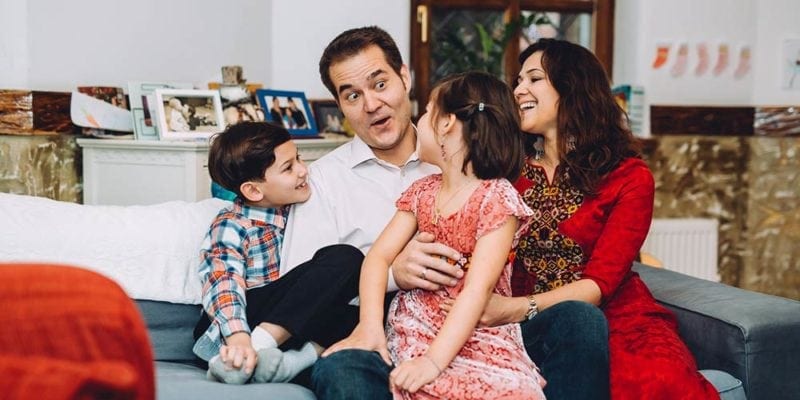“Dad! Can I use my money to buy 800 Robux?” My son’s voice gets louder as he approaches the living room to make his request face to face. I reply, “So that money you just earned, you want to spend on Robux? Is that a good idea?” I can practically see his inner struggle. Do I save my money for a “real” toy, or buy a new skin for my Roblox dude? Part of me wants to forbid wasting money on in-app purchases. Then I think, It’s his money, so I should talk it through with him.
Turns out this interaction is an example of authoritative parenting. I don’t always respond this way, but research published in the Journal of Marriage and Family shows kids raised by authoritative parents are more likely to become independent, self-reliant, socially and academically successful, and well-behaved. Think you fit the bill? Here are 5 signs you’re an authoritative parent and ways to adapt to take on more of this style.
1. You discipline to teach, not to punish.
One of my kids has an issue with turning in schoolwork. He’s been told the consequence of a zero is no tech over the weekend. Two days after we laid out this rule, he left a folder at home and missed the due date for a science worksheet. He turned it in late.
In this scenario, authoritative parenting says we still take away tech even though he turned in the assignment. We compromised by giving him one day of tech back since he didn’t get a zero. As I struggled with what to do, I had to remind myself of the end goal. It’s not to get this one assignment turned in. It’s not his science grade. The goal is to teach him to grow in responsibility. The goal of discipline should always be to teach, not punish.
2. You’re warm and loving.
You may have heard of “authoritarian parenting.” That’s the “if you live in my house, you’ll follow my rules” style. There’s not a whole lot of warmth to it. Meanwhile, authoritative parents respond to a child’s need to feel loved and supported. Both authoritarian and authoritative parents demand a lot from their kids, but authoritative parents also give a lot to their children through responsiveness, affection, and attention.
3. You encourage independence and responsibility.
My Roblox conundrum is an example of this characteristic of authoritative parenting. I put the virtual ball in his court. If he chose to spend his money on digital coins, so be it. He has to deal with the repercussions of not having cash when he wants to buy something at the store.
You can develop this part of authoritative parenting by giving your kids opportunities to make their own choices and to learn from their mistakes. Teach them problem-solving skills and help them to develop their own moral compass with suggestions like, “Why don’t you wait a few hours to decide to make the purchase,” or, with deeper issues, “Does this decision line up with what we believe as a family?”
4. You’re flexible.
My son started his second hour of homework, looked at me with tears in his eyes, and said, “And I still have to pack my lunch!” I’d told him at the start of the year that I was retiring from lunch packing, so he has it on his nightly mental checklist. “I can help you, bud. It’s OK.”
As much as I want to teach him responsibility, I also want him to know there are times when we all need to be more lenient, show grace, and help out someone who’s having a tough day. Judging when to do this isn’t easy because it can tiptoe into permissive parenting territory. Like most things we do as dads, it’s about balance.
5. You listen.
My friend’s son desperately wanted a phone for his thirteenth birthday. She and her husband were against it, but they listened as he stated his case. The authoritarian says, “I don’t need to hear what you have to say. I’m the parent, and I know what’s best.” But listening, giving your full attention, and attempting to understand your child’s point of view are characteristics of authoritative parenting and a great way to make your kid feel respected.
Sound off: What part of authoritative parenting comes most naturally to you, and which do you really have to focus on?











Huddle up with your kids and ask, “If you could give advice to a parent of a kid your age, what would you say?”